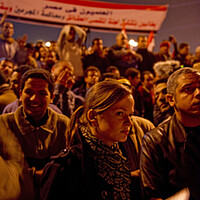Egypt's Muslim Brotherhood scoffs at reconciliation
Loading...
| Cairo
Behind the mosque that has become the focal point of the Muslim Brotherhood's protests, members of a dissolved parliamentary body convened yesterday to do business.
The speaker sat at a table covered with blue cloth, next to an Egyptian flag and underneath a banner reading “Shura Council,” the name of the upper house of parliament that held legislative power under former President Mohamed Morsi, who was ousted by the military on July 3. Former legislators crammed into crowded rows and adopted resolutions rejecting Egypt's military coup and the decisions of the interim government.
The symbolic session took place as the new interim government forged ahead. The Ministry of Supply is importing wheat to shore up Egypt's dwindling supply for subsidized bread and the committee formed by the interim president to draft amendments to the constitution began its work Sunday.
As the military and Muslim Brotherhood square off, violence is rising. Nine people died overnight in clashes, most in Cairo. About 100 people have died since Morsi was ousted on July 3.
Brotherhood leaders say they will continue to protest until Morsi is reinstated – even if only long enough to call early presidential elections. Until then, they will not recognize or participate in the political process, they insist.
“Our long term strategy is patience. We are not in a hurry,” says Amr Darrag, a senior Brotherhood member and a minister in Morsi's government. “What else can we do? Do we wait till we are all put in jail and our parties are shut down and we are completely removed from political life?”
Clinging to Morsi
Egypt's military – the force behind all presidents since 1952 except Morsi – stepped in to remove Egypt's first freely-elected leader after millions, frustrated over Morsi's autocratic ruling style and failure to solve Egypt's many crises, took to the streets on June 30 to call for early presidential elections.
Army chief Gen. Abdel Fattah al-Sisi suspended the constitution and appointed the head of Egypt's Supreme Constitutional Court, Adly Mansour, as interim president. Mr. Mansour formed a cabinet and released a constitutional declaration laying out a timeline for a transition back to elected leaders, stipulating that after the constitution is amended, parliamentary and presidential elections will be held.
Meanwhile, authorities arrested top leaders of the Brotherhood and issued arrest warrants for others. Hundreds of low-level Brotherhood members have also been arrested, though some have been released. On July 8, military and police fired on a crowd of pro-Morsi demonstrators, killing 54.
Brotherhood leaders have remained defiant, staging large protests throughout Egypt and maintaining a sit-in at Rabaa El Adawiya mosque in Cairo's Nasr City neighborhood. Publicly, they say they refuse any negotiations to end the standoff until the military agrees to reinstate Morsi, at which point, they say, “everything” will be up for negotiation.
“The solution has to abide by the democratic standards, has to restore legitimacy, and after that we will be open to discuss anything and we can accept anything that would save the country, but under the umbrella of legitimacy not under the umbrella of a military coup,” says Dr. Darrag, the Brotherhood member and former government minister.
“We are not saying that the president should come and should finish his term. We are saying that he should come back as a symbol of legitimacy and then anything can be discussed.” The Brothers also insist that their movement is growing, as more Egyptians join the protests against the military's coup d'etat. “There are millions in the streets and they are increasing. And everyone has to acknowledge this,” says Darrag.
Any hope for reconciliation?
Yet outside Rabaa el Adawiya square many Egyptians in Cairo refer to Brotherhood members as “terrorists” and say there is no need for the group to participate in public life.
Khalil Al Anani, an expert on the Brotherhood at Durham University in Britain who is currently in Cairo, says a negotiated solution to bring Egypt's most organized group back into political life would be possible if there was an incentive, but that Brotherhood leaders only feel threatened so far.
“If they found that the military is really genuine in offering them assurances about their future, they would accept to negotiate,” says Anani. “However, they believe the military is intending to uproot them, and eradicate them. .. that's why the MB doesn't trust the military so far. If the Brotherhood feels that there are genuine guarantees about their future, they would negotiate even if Morsi would not be reinstated.”
Brotherhood leaders are now under growing pressure from members to hold firm. Many of the protesters at the sit-in say they will not leave until Morsi is restored to the presidency and say they are prepared to sacrifice their lives for that goal.
Morsi himself has been detained and incommunicado since July 3. His family decried the illegal detention yesterday in a press conference, saying he had not been heard from since the military took him into custody along with this top aides. The military says he is being held for his own safety and refuses to disclose his location.
In a speech delivered last night, interim president Mansour called for reconciliation and an end to hate and division. “Now is the time to build our nation,” he said.
Presidential advisor Mostafa Higazy said Mansour would begin a process of reconciliation and transitional justice on Wednesday, and that the president had invited Brotherhood leaders to participate, but also said Brotherhood leaders must be held accountable for their crimes.
He said some, including Brotherhood leaders, have incited violence from the protest in Rabaa El Adawia.
“People calling for killing, people calling for terror, people calling for intimidating and maybe attacking military establishments -- and at the end of the day you can't say those are not legally punishable actions,” he said.








